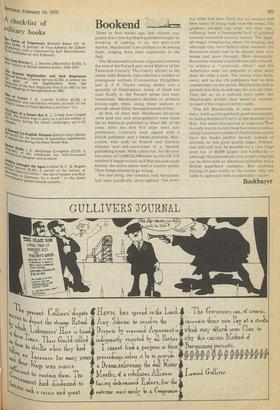Bookend
Three or four weeks ago, this column suggested that a few hardback publishers might be thinking of cashing in on the part-work market. Macdonald"s are unlikely to be among them, judging from their experience in the field.
The Macdonald's scheme originated towards the end of the Purnell part-work History of the Twentieth Century. The history adviser to the series, John Roberts, had collected a number of prestigious authors (Constantine Fitzgibbon and A. J. P. Taylor among them); and a quantity of illustrations, many of them not used finally in the Purnell series had been researched. Macdonald's decided to produce twenty-eight titles, using these authors to provide about thirty thousand words of text.
At first, all went well. Handsome advances were paid out, and arrangements were made for an American publisher to share 50% of the costs. After the first five titles went into production, contracts were signed with a Dutch publisher, and a Swiss publisher, Rencontre, who took on French and German editions and sub-contracted to a Spanish publishing house. With a print run, for the next two titles, of 72,000(32,500 taken by the UK /US market) it began to look as if Macdonalds could sustain the entire series with a healthy profit. Then things started to go wrong.
For one thing, the contract with Rencontre had been hooifically short-sighted. The print
ing order had been fixed, but no account had been taken of rising costs over the series. The germans ducked out after the first two, suffering from a foreseeable lack of goodwill towards twentieth century history. The Spanish began complaining about the binding, and although they were held to their contract, the Rencontre terms had to be altered after nine books had gone through. More drastically, Rencontre wanted to publish one title a month, to achieve a "continuity effect," and the Americans were not prepared to issue more than six titles a year. The timing went badly awry, and as the US publishers had no firm commitment to the series. Macdonalds had to gamble that they would take the next six titles. They did so, on a reduced print order, but Macdonalds docked their series to nineteen instead of the original twenty-eight.
This left Macdonalds, in some embarrassment, holding nine perfectly good manuscripts, including Raymond Carr's on the Spanish Civil War. The series has proved so expensive hat the only way to tackle these has been to reduce colour tones and number of illustrations, and to have the books perfect bound, instead of stitched, on less good quality paper. Publication will still only be possible on a very large print run of 40,000 (paper and hardback) — although Macdonalds are very hopeful that his can be done with an American publisher and a British paperback company. But anything hinting of part-works in the future, they are liable to approach with considerable caution.
Bookbuyer










































 Previous page
Previous page